
FAO supports governments and regional bodies to address their needs and priorities in achieving food security, reducing hunger and malnutrition, developing agricultural, fishery and forestry sectors, and ensuring the sustainable use of environmental and natural resources. The FAO Sub-regional Resilience Team for southern Africa (SFS-REOSA) based in Johannesburg, South Africa, leads FAO’s work to reduce vulnerability and risks of food and nutrition insecurity by strengthening the productive capacity and livelihoods of vulnerable groups in southern Africa. SFS-REOSA provides support to regional bodies, governments and FAO country offices in the design and implementation of emergency and resilience-building initiatives for the agriculture, food and nutrition security sector in southern Africa.
In contribution to FAO’s Strategic Framework, SFS-REOSA seeks to establish Anticipatory Action Protocols, generate evidence for advocacy and build strong partnerships to scale up anticipatory action to protect lives and livelihoods. The overall objective of anticipatory action is to ensure that relevant actions are implemented before the peak impact of the hazard, to protect development gains, thereby bridging the gap between the humanitarian, development and peace nexus.
Reporting Lines
The Agrometeorological Specialist reports to the Resilience Team Leader. He/She will work closely with national and regional technical officers (early warning, anticipatory action, social protection/cash preparedness/crop/livestock/operations and administration) to produce technical outputs of the programme.
Technical Focus
Support the overall implementation of the programme, development of technical outputs and monitoring of the anticipatory action programme. Includes research on disaster risk financing and social protection, design of databases and websites, policy reviews and the development of triggers for drought, cyclones and floods.
The Agrometeorological Specialist will undertake the following duties:
• Undertake research on early warning systems, climate forecast indicators; seasonal observation indicators, vulnerability data and trends, including statistics to support the delivery of the design of anticipatory action systems, Anticipatory Action Plans and technical outputs;
• Generate data and statistics for reports, risk monitoring, and as input for technical documents and web pages related to disaster risk reduction, social protection, early warning and anticipatory action;
• Provide technical support for joint After Action Review studies, return on investment studies, inter-agency studies on social protection, and disaster risk financing;
• Provide technical backstopping to field projects to monitor the implementation of anticipatory action projects, including cash+ activities;
• Support the development and improvement of tools for risk monitoring, early warning systems, and database development;
• Support the development of guidelines for SADC member states who are starting up anticipatory action projects, based on key learnings from pilot projects;
• Support the development of national roadmaps and simulation exercises with partners and national governments;
• Support the development of a knowledge management platform on anticipatory action;
• Participate in multi-disciplinary and inter-agency team meetings to streamline technical outputs and agree on project deliverables,
• Participate in the regional working group on anticipatory action, including the sub-working group on drought to adequately provide relevant information and data on FAOs Drought Trigger and assist with harmonizing inter-agency triggers for drought;
• Support capacity building on anticipatory action, including emerging themes such as social protection, disaster risk financing, drought, cyclone and flood trigger development for regional and national partners, including SADC member states.
• Provide technical support to the regional EWAA team to organize major regional and national events, including preparation of related information, learning materials and on-line tools;
• Support the regional EWAA team to identify donors and write concept notes for source mobilization activities in accordance with the FAO Corporate Strategy.
• A university degree in agro-meteorology, disaster risk reduction, or related sciences;
• Five years of relevant experience in analyzing climate data and impacts on agriculture, disaster risk reduction, or anticipatory action;
• Working knowledge (Level C) of English and limited knowledge (Level B) of one of the other FAO languages (Arabic, Chinese, French, Russian or Spanish). For PSA, working knowledge of English
FAO Core Competencies
• Results Focus
• Teamwork
• Communication
• Building Effective Relationships
• Knowledge Sharing and Continuous Improvement
Technical/Functional Skills
• Strong research skills in qualitative and quantitative data analysis;
• Strong experience in developing anticipatory action protocols for cyclones and floods, dry spells and drought;
• Experience in coordinating implementation of actions for drought, cyclones and floods at field level;
• Expert knowledge of disaster risk reduction policies and frameworks, including contingency planning at country level;
• Knowledge and experience leveraging social protection systems for anticipatory action, and use of cash+ approaches for anticipatory action;
• Knowledge of and experience in working with early warning systems and indicators for food security, agriculture and nutrition.
• Strong experience with managing ECHO funded projects will be an added advantage.



